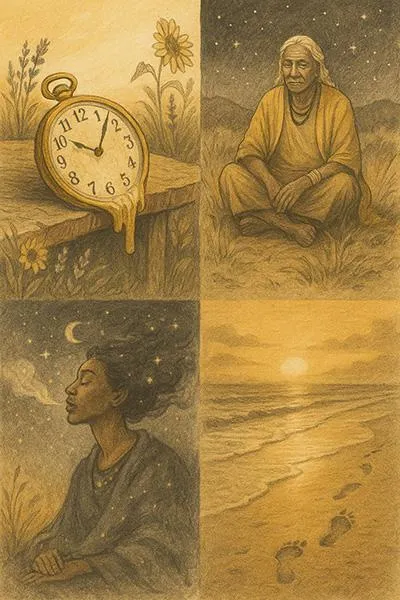
The Punctuality Parable
This story is for you If you ever struggle with your relationship with time. Someone I hold dear once shared that they want to “learn to slow down and be present.”
Maybe you too believe that what you need to do is “stop taking on so much and have better boundaries.”
In this essay, I’m going to break down why while this sounds wise, it’s actually a reflection of a strained relationship with Time, and is not necessary.
Let me explain.
Recently, in a few interactions, I felt how an expectation around time, and my perceived failure to meet it, led not to curiosity or conversation, but to withdrawal. To unspoken judgment. To relational distance.
And it made me think.
Not just about punctuality, or communication styles, or even misunderstandings.
It made me think about the story underneath how we treat time itself.
Because in these moments, it wasn’t really about minutes or meetings. It was about a deeper, older agreement—one most of us inherited without question—that says:
time is fixed, you must serve it, and your worthiness is measured by how well you do.
The Punctuality Parable
Once upon a time, there was a story that was told. We don’t know who or when exactly or even why it started being told, but the story picked up speed.
We can probably thank violence for that.
Pretty soon, almost everyone in one part of the world was believing this story, and forcing others to agree that it was true.
That story is coined the Story of Separation by orator Charles Eisenstein.
The Story of Separation is actually a collection of parables.
Let’s call one of these the Punctuality Parable.
The Punctuality Parable claims that Time is the taskmaster. Time owns us, and we are its slaves.
In this old story, time is rigid. Time is the invisible judge standing in the room, checking a clipboard and tapping a watch.
If you are late, you are deemed inconsiderate. If you need fluidity, you are irresponsible. If you value connection over punctuality, you are “not serious” or “not respectful.”
Failure to be punctual is then accompanied by shame and/or guilt.
This story doesn’t make space for humanity. It doesn’t hold the possibility that maybe—just maybe—there is something more important happening than a clock. It measures value in minutes instead of moments.
And when we’re steeped in it, we’re trained to react. To assume that a late arrival is an insult, a missed meeting is a disregard, a follow-up is an unfair burden. Without ever asking,
Without remembering that we invented time.
We created it as a tool—not a weapon.
An alternate definition of being “on time”
“Shame on you, you’re 20 minutes late!!”
Said NO indigenous steward of land. Ever.
When one is synced with the rhythms of life, arranging meetings by Gregorian clocks becomes an amusing experience.
We even have a playful name for it… “CP time.”
Now, while it might be a controversial phrase, have you ever stepped back to wonder where the idea of punctuality came from?
It certainly didn’t come from people who are tuned in to natural rhythms.
People who know that we and the Earth are the same, and care for her as they care for themselves.
To true stewards of our home, being “on time” means something completely different.
They have cultivated a patience and malleability with the timing of things that is still.
There is a clear understanding of the relationships that inform the timing of events, and that one (a human) is only a small part of the big picture, and thus of the decision on timing.
Now, we don’t live purely in the natural world, but there is something to be said for tuning in more to the body’s messages - our connection to the bigger picture - the natural flow of life.
I’m increasingly finding that the “timing” of when things are best suited to happen in my daily life often doesn’t match the “times” I’ve committed to be in a certain place or gathering.
And when that happens, I’m learning to trust my body’s cues more and the need to meet the clock less. Not because I don’t care about my agreements, but because I’m learning to prioritize better.
The key is, when I relax, trust in the higher wisdom of listening to and honoring what is happening in the moment, and let it unfold with grace, no one gets hurt.
it’s taken me decades to realize that…
This priority we have learned to give to “punctuality” is colonial.
It’s part of the illusion of the Story of Separation that implies (incorrectly) that we have more control than we actually have. It makes our made up ideas of when something should happen more important than when things are actually happening.
Of course, I clearly see the need for agreements on when we meet. I’m simply offering a different way of relating to time that will probably be life-changing for many.
It doesn’t replace the need for arrangements; it replaces the need for prioritizing punctuality over the original reason for the arrangements - which likely has something to do with human connection.
Time Isn’t Fixed. It’s Felt.
I remember first learning this concept from Tony Robbins decades ago. He gave the illustration of how we experience time when it’s something we enjoy doing versus something we don’t.
Two hours at the DMV feels like a lifetime. Two hours dancing under the stars? Feels like five minutes.
That’s because time isn’t actually fixed. It’s felt.
So why do we pretend time is rigid, when our bodies and our hearts know it's anything but?
What if we stopped squeezing ourselves into artificial structures, and instead began attuning to the real rhythms of aliveness?
When we treat time like something static and external, we lose touch with our own inner rhythms. But when we experience it as something that moves through us, like breath or water, we begin to trust the intelligence in its ebb and flow.
There are days I move quickly and meet every hour with ease. There are other days where I’m two steps behind, but deeply attuned to everything and everyone around me. And I’ve started to ask: why should one version of me be more valid than the other?
What if honoring the truth of our timing is the most respectful thing we can do?
Time as Stewardship, Not Ownership
It’s not that being on time doesn't matter.
It’s our definition of being on time that might matter more.
It’s how we hold time—how we relate to it—that matters even more.
We previously noted that the idea of prioritizing punctuality is colonial — domination, control, ownership-based.
When we see time as stewardship instead of ownership, everything changes.
Stewardship means we honor time as something we tend, not something we control. It invites grace. It invites understanding. It balances honoring a schedule with honoring the humans for whom the schedule was created.
What Charles Eisenstein calls the Story of Interbeing, the ways of the era we are entering globally, teaches us:
Time is not more sacred than people.
And the connections we build when we honor each other's humanity? Those are the moments that last far longer than any missed meeting.
From Time Warden to Time Bender
At the outset, I mentioned that it is unnecessary for those who want to slow down and be more present to “stop taking on so much and have better boundaries”, and that this wish is actually indicative of a strained relationship with Time to begin with.
What did I mean?
Well, first of all, I will say that there could be many completely different reasons why someone would take on “so much” or not “have better boundaries”.
I will focus on how you can bend time so that this is not a worry, through the lens of DECOLONIZING your relationship with time.
When you think about ‘stopping taking on so much’ - it feels frenetic - a desire to prove one’s value by doing, doing, doing.
If we think of holding to strict times (aka punctuality) as a way to take control of our time, the first question to ask is:
‘WHY do I need so much control? What in my life feels so out of control that I need to hold to strict times or take on more than feels good so as to prove my value?’
Often, there are some internal components to this puzzle, but if we focus on the collective need for control through the restrictive way we are encouraged to relate to time, you’ll probably find some clues.
Finally, the phrase having ‘better boundaries’ reflects having a strained relationship with Time because it implies that there are poor, good, better etc when it comes to our boundaries, and that we have a CHOICE about our boundaries… when we really don’t.
Our boundaries are our limitations (look up the definition). Our skin, the capacity of our bladder, or our lung capacity under water are all natural boundaries.
When we judge our boundaries as good or bad or whatever, we aren’t seeing what we DO have control of… our communication.
If we can learn to respectfully COMMUNICATE our natural boundaries i.e. our natural limits from moment to moment, we won’t succumb to any internal or external pressure to ‘take on too much’ or set fake boundaries.
Instead, we will be able to use even moments of withdrawal as opportunities to deepen connection with our fellow human beings, which is the whole point, anyway.
And this is one way we can start bending time.
In a world obsessed with tracking minutes, maybe the real revolution is learning to cherish the moments instead.
Perhaps it’s time to decolonize our relationship with time.
P.S. Did you know that about half of us are wired to have a more fixed relationship with time and half of us are more fluid with it?
If this resonates, and you would like to gain a deeper understanding of the art of time bending, or how to stay connected with people who are wired differently from you, drop a ‘Bend’ below so I can get a count.
#time #timebending #punctuality #boundaries #globalvillagecampus #therealdeboraha


